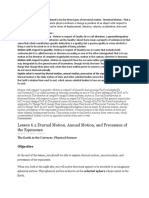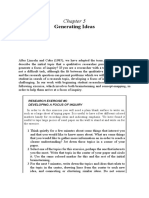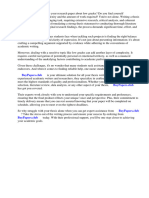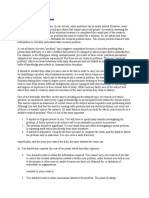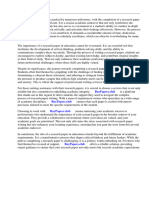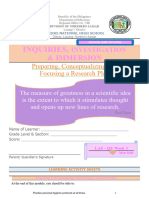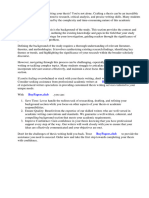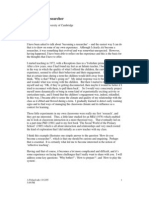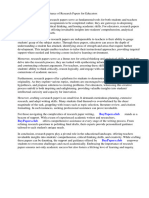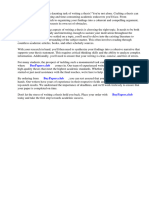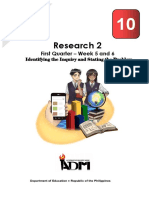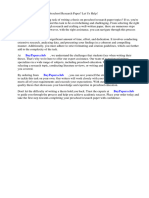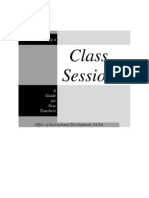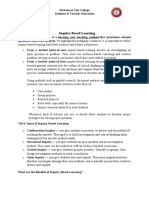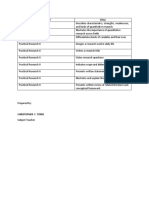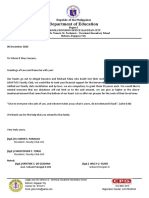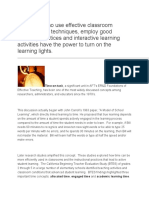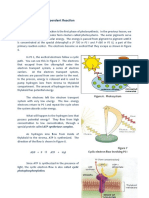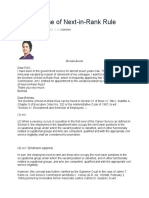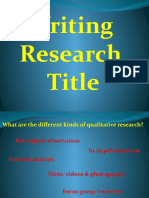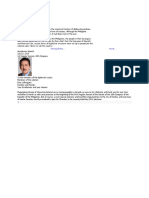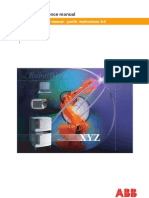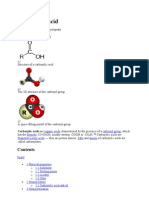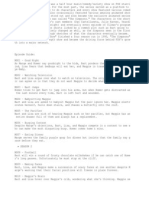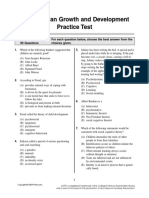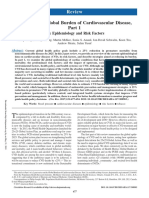Professional Documents
Culture Documents
Work
Work
Uploaded by
ChristoPher Torio0 ratings0% found this document useful (0 votes)
23 views3 pages1. How does achievement motive relate to differential mobility among young professionals in London?
2. What factors influence verbal creativity among senior high school students in suburban Chicago?
3. Why is creativity through music instruction related to academic achievement among elementary school students?
4. When and why do school officials and teachers in rural districts choose to change schools or districts?
5. Who are the children with low self-acceptance and poor adjustment that also struggle with academic achievement in an urban school district, and what interventions could help them?
Original Description:
immersion
Original Title
work
Copyright
© © All Rights Reserved
Available Formats
DOC, PDF, TXT or read online from Scribd
Share this document
Did you find this document useful?
Is this content inappropriate?
Report this Document1. How does achievement motive relate to differential mobility among young professionals in London?
2. What factors influence verbal creativity among senior high school students in suburban Chicago?
3. Why is creativity through music instruction related to academic achievement among elementary school students?
4. When and why do school officials and teachers in rural districts choose to change schools or districts?
5. Who are the children with low self-acceptance and poor adjustment that also struggle with academic achievement in an urban school district, and what interventions could help them?
Copyright:
© All Rights Reserved
Available Formats
Download as DOC, PDF, TXT or read online from Scribd
Download as doc, pdf, or txt
0 ratings0% found this document useful (0 votes)
23 views3 pagesWork
Work
Uploaded by
ChristoPher Torio1. How does achievement motive relate to differential mobility among young professionals in London?
2. What factors influence verbal creativity among senior high school students in suburban Chicago?
3. Why is creativity through music instruction related to academic achievement among elementary school students?
4. When and why do school officials and teachers in rural districts choose to change schools or districts?
5. Who are the children with low self-acceptance and poor adjustment that also struggle with academic achievement in an urban school district, and what interventions could help them?
Copyright:
© All Rights Reserved
Available Formats
Download as DOC, PDF, TXT or read online from Scribd
Download as doc, pdf, or txt
You are on page 1of 3
THE FIVE‘WS’ When you start to think about your research project, a useful way of
remembering the important questions to ask is to think of the five ‘Ws’:
What?
What is your research? This question needs to be answered as specifically as possible. One of
the hardest parts in the early stages is to be able to define your project, so much research fails
because the researcher has been unable to do this. A useful tip is to sum up, in one sentence
only, your research. If you are unable to do this, the chances are your research topic is too
broad, ill thought out or too obscure.
Why?
Why do you want to do the research? What is its purpose? Okay, you might have been told to
do some research by your tutor or by your boss, but there should be another reason why you
have chosen your particular subject. It might be solely to do with the fact that you are
interested in the topic. This is a good start as you need to be interested in your research if you
are to keep up your enthusiasm and remain motivated. Or you might have identified a gap in
the research literature – this is good as it shows you have carried out careful background
research. Or perhaps you want to try to obtain funding for a particular service or enterprise and
you need to do some research first to find out if there is demand for what you are proposing.
Whatever your reason, think very carefully about why you are doing the research as this will
affect your topic, the way you conduct the research and the way in which you report the
results. If you’re doing it for a university dissertation or project, does your proposed research
provide the opportunity to reach the required intellectual stan- dard? Will your research
generate enough material to write a dissertation of the required length? Or will your research
generate too much data that would be impossible to summarise into a report of the required
length? If you’re conducting research for funding purposes, have you found out whether your
proposed funding body requires the information to be presented in a specific format? If so, you
need to plan your research in a way which will meet that format.
Who?
Who will be your participants? (In this book, people who take part in research will be called
participants or respondents, rather than ‘subjects’, which is a term that I have never liked.) At
this stage of the research process, you needn’t worry too much about exactly how many
participants will take part in your research as this will be covered later (see Chapter 5).
However, you should think about the type of people with whom you will need to get in touch
with and whether it will be possible for you to contact them. If you have to conduct your
research within a particular time scale, there’s little point choosing a topic which would include
people who are difficult or expensive to contact. Also, bear in mind that the Internet now
provides opportunities for contacting people cheaply, especially if you’re a student with free
internet access.
Where?
Where are you going to conduct your research? Thinking about this question in geographical
terms will help you to narrow down your research topic. Also, you need to think about the
resources in terms of budget and time that are 6 / PRACTICAL RESEARCH METHODS HOW TO
DEFINE YOUR PROJECT / 7 available to you. If you’re a student who will not receive travel
expenses or any other out of pocket expenses, choose a location close to home, college or
university. If you’re a member of a community group on a limited budget, only work in areas
within walking distance which will cut down on travel expenses. Also, you need to think about
where you’ll be carrying out your research in terms of venue. If you’re going to conduct
interviews or focus groups, where will you hold them? Is there a room at your institution which
would be free of charge, or are you going to conduct them in participants’ own homes? Would
it be safe for you to do so? Would you be comfortable doing so? If you’ve answered ‘no’ to
either of these last two questions, maybe you need to think again about your research topic. In
15 years I have encountered only one uncomfortable situation in a stranger’s home. It can
happen and you must never put yourself in a dangerous situation. Think very carefully about
whether your chosen topic and method might have an influence on personal safety.
When?
When are you going to do your research? Thinking about this question will help you to sort out
whether the research project you have proposed is possible within your time scale. It will also
help you to think more about your participants, when you need to contact them and whether
they will be available at that time. For example, if you want to go into schools and observe
classroom practice, you wouldn’t choose to do this research during the summer holiday. It
might sound obvious, but I have found some students present a well-written research proposal
which, in practical terms, will not work because the participants will be unavailable during the
proposed data collection stage. Once you have thought about these five ‘Ws’, try to sum up
your proposed project in one sentence. When you have done this, take it to several people,
including your boss and/or tutor, and ask them if it makes sense. Do they understand what your
research is about? If they don’t, ask them to explain their confusion, revise your statement and
take it back to them. I can’t overemphasise the importance of this stage of the research
process. If you get it right now, you will find that the rest of your work should flow smoothly.
However, if you get it wrong, your problems could well escalate. The following exercise will help
you to think more about these issues.
Improve the following titles using the elements of research:
Titles Improved Titles
1.The Relationship of Achievement
Motive to Differential Mobility
2.Verbal Creativity Among Senior
High School Students
3.The Relationship Between
Creativity and Music Achievement
4.School Officials and Teachers
Mobility
5.A Study of the Relationship of Self-
Acceptance, Adjustment and
Achievement of Children
You might also like
- Job Safety AnalysisDocument2 pagesJob Safety AnalysisQin Qin67% (9)
- Certification of No Pending Administrative CaseDocument1 pageCertification of No Pending Administrative CaseChristoPher Torio100% (5)
- Sorsogon National High SchoolDocument4 pagesSorsogon National High SchoolLouise Joseph Peralta0% (1)
- Mims PR2 LC6 LC7 Quantitative ResearchDocument11 pagesMims PR2 LC6 LC7 Quantitative ResearchJester Guballa de LeonNo ratings yet
- JDVP ProgramDocument3 pagesJDVP ProgramChristoPher Torio67% (3)
- Conceptual Framework: A Step by Step Guide On How To Make OneDocument3 pagesConceptual Framework: A Step by Step Guide On How To Make OneChristoPher TorioNo ratings yet
- Explain What The Greeks Considered To Be The Three Types of Terrestrial MotionDocument40 pagesExplain What The Greeks Considered To Be The Three Types of Terrestrial MotionChristoPher Torio91% (22)
- Compenium of Alchemical ProcessesDocument53 pagesCompenium of Alchemical ProcessesJoao Carlos Pimentel100% (2)
- The FutureDocument8 pagesThe FutureTrang Choi ChoiNo ratings yet
- The Five Ws of Your ResearchDocument8 pagesThe Five Ws of Your Researchmayraponcerodriguez19No ratings yet
- Generating Ideas: Research Exercise #5: Developing A Focus of InquiryDocument6 pagesGenerating Ideas: Research Exercise #5: Developing A Focus of InquiryMuhammad Asif 360-FSS/MSEDU/S20No ratings yet
- AP Research Survival Guide - RevisedDocument58 pagesAP Research Survival Guide - RevisedBadrEddin IsmailNo ratings yet
- Como Realizar Tu Busqueda de Informacion.Document27 pagesComo Realizar Tu Busqueda de Informacion.Oscar PeñaNo ratings yet
- Emma Martinez - Reading Practical Research Planning and Design Chapter 1 2 PDocument3 pagesEmma Martinez - Reading Practical Research Planning and Design Chapter 1 2 Papi-407834182No ratings yet
- Teaching Research Paper To High School StudentsDocument8 pagesTeaching Research Paper To High School Studentsegy04nvm100% (1)
- Framing A Research QuestionDocument5 pagesFraming A Research QuestionKwan LeeNo ratings yet
- Handbook in Psych 125Document14 pagesHandbook in Psych 125Angelica Rose EspornaNo ratings yet
- Research Questions For Literature Reviews: Why A Literature Review?Document4 pagesResearch Questions For Literature Reviews: Why A Literature Review?Heidi OhNo ratings yet
- Possible QuestionsDocument6 pagesPossible QuestionsMika Angea AbuemeNo ratings yet
- Formulation of A Research Problem and QuestionDocument6 pagesFormulation of A Research Problem and QuestionCates CaponNo ratings yet
- Pracres1 Chapter 3 Module 2021Document5 pagesPracres1 Chapter 3 Module 2021Prince SanjiNo ratings yet
- Research Paper About Low GradesDocument6 pagesResearch Paper About Low Gradescakwn75t100% (1)
- Research HypothesisDocument7 pagesResearch HypothesisSherwin Jay BentazarNo ratings yet
- Tips For Writing Interview Protocols and Conducting InterviewsDocument10 pagesTips For Writing Interview Protocols and Conducting InterviewsPsi Chi Capítulo UPR-RPNo ratings yet
- How To Make A Research Paper QuestionDocument5 pagesHow To Make A Research Paper Questionfveec9sx100% (1)
- Lesson - Research ProblemDocument9 pagesLesson - Research ProblemJohn AgnerNo ratings yet
- IB Extended Essay - What Should I Write AboutDocument11 pagesIB Extended Essay - What Should I Write Aboutnellytusiime75% (4)
- Week 2 - Topic OverviewDocument13 pagesWeek 2 - Topic OverviewOmisile Kehinde OlugbengaNo ratings yet
- Research Paper About Study SkillsDocument5 pagesResearch Paper About Study Skillsmqolulbkf100% (1)
- Research Identifying GapsDocument4 pagesResearch Identifying Gapsmurthy tataNo ratings yet
- Example Psychology Research Paper TopicsDocument8 pagesExample Psychology Research Paper Topicsaflbskzqa100% (1)
- Writing A Good Research QuestionDocument5 pagesWriting A Good Research QuestionAhmad AsyrafNo ratings yet
- Research Paper Topics About TeachingDocument8 pagesResearch Paper Topics About Teachingzepewib1k0w3100% (1)
- Week 10 Handout Reading and ReflectionDocument2 pagesWeek 10 Handout Reading and ReflectionShane AnnNo ratings yet
- Importance of Research Paper in EducationDocument5 pagesImportance of Research Paper in Educationc9sf7pe3100% (1)
- Teaching Research Papers ElementaryDocument5 pagesTeaching Research Papers Elementaryd0f1lowufam3100% (1)
- Iii 1Document9 pagesIii 1Juliebeth LucianoNo ratings yet
- Research Paper Teacher EducationDocument5 pagesResearch Paper Teacher Educationiigheacnd100% (1)
- Background of The Study in Research Paper DefinitionDocument8 pagesBackground of The Study in Research Paper Definitionafeaqzhna100% (1)
- Questions To Ask Research PaperDocument4 pagesQuestions To Ask Research Paperqosryjvnd100% (1)
- AndrewDocument6 pagesAndrewgoahelloNo ratings yet
- Examples Broad Topics Research PaperDocument8 pagesExamples Broad Topics Research Paperfzjzn694100% (1)
- Research Paper Topics Grade 5Document7 pagesResearch Paper Topics Grade 5shvximwhf100% (1)
- 3is ModuleDocument23 pages3is Modulegraceannbechachino05No ratings yet
- Guideline For Writing Proposal & Thesis December 2020Document28 pagesGuideline For Writing Proposal & Thesis December 2020Sabir ImamNo ratings yet
- Can I Ask Questions in A Research PaperDocument4 pagesCan I Ask Questions in A Research Paperj0lemetalim2100% (1)
- Questions To Ask in A Research Paper InterviewDocument5 pagesQuestions To Ask in A Research Paper Interviewnekynek1buw3100% (1)
- Importance of Research Paper To TeachersDocument7 pagesImportance of Research Paper To Teachersgw0drhkf100% (1)
- Good College Research Paper TopicsDocument6 pagesGood College Research Paper Topicswtdcxtbnd100% (1)
- Multi Genre Research Paper ExamplesDocument5 pagesMulti Genre Research Paper Exampleskquqbcikf100% (1)
- Writing and Presenting Your Thesis or DissertationDocument14 pagesWriting and Presenting Your Thesis or DissertationDenkenNo ratings yet
- Guideline For Writing Proposal & Thesis January 2021Document28 pagesGuideline For Writing Proposal & Thesis January 2021bantegiNo ratings yet
- Research 2: First Quarter - Week 5 and 6Document20 pagesResearch 2: First Quarter - Week 5 and 6Rutchel100% (2)
- Background of Research: LessonDocument8 pagesBackground of Research: LessonSher-Anne Fernandez - BelmoroNo ratings yet
- PR 1 Notes Q2Document7 pagesPR 1 Notes Q2david vinasNo ratings yet
- Research Paper Topics PreschoolDocument8 pagesResearch Paper Topics Preschoolsuz1sezibys2100% (1)
- Class Session: Planning ADocument13 pagesClass Session: Planning AJ. BarreraNo ratings yet
- Practical Research 2 q1Document19 pagesPractical Research 2 q1Necole Ira BautistaNo ratings yet
- Duque, Angelica C. Bsed Ii-Filipino Inquiry Based Learning: Mabalacat City College Institute of Teacher EducationDocument12 pagesDuque, Angelica C. Bsed Ii-Filipino Inquiry Based Learning: Mabalacat City College Institute of Teacher EducationAngelica Cunanan DuqueNo ratings yet
- Uh Dissertation GuidelinesDocument8 pagesUh Dissertation GuidelinesCanYouWriteMyPaperForMeSiouxFalls100% (1)
- Research HandoutsDocument8 pagesResearch HandoutsJessabel ArnadoNo ratings yet
- The Process: More Like ThisDocument10 pagesThe Process: More Like ThisRica RaviaNo ratings yet
- Good Questions To Ask About Research PapersDocument5 pagesGood Questions To Ask About Research Paperslyn0l1gamop2100% (1)
- Good Research Paper QuestionsDocument8 pagesGood Research Paper Questionsfyt18efe100% (1)
- Writing A Psychology Thesis IntroductionDocument7 pagesWriting A Psychology Thesis Introductionadrianawilsonpaterson100% (2)
- Chemistry, Strategic Paths to UnderstandingFrom EverandChemistry, Strategic Paths to UnderstandingRating: 5 out of 5 stars5/5 (1)
- PR 2Document1 pagePR 2ChristoPher TorioNo ratings yet
- L&D Needs Assessment ReportDocument6 pagesL&D Needs Assessment ReportChristoPher Torio100% (1)
- Department of Education: Republic of The PhilippinesDocument2 pagesDepartment of Education: Republic of The PhilippinesChristoPher TorioNo ratings yet
- Experiment: Fill The Plastic Soda Bottle To The VERY Top With WaterDocument7 pagesExperiment: Fill The Plastic Soda Bottle To The VERY Top With WaterChristoPher TorioNo ratings yet
- Daily Task June 21,2020Document48 pagesDaily Task June 21,2020ChristoPher TorioNo ratings yet
- Male Female Total Grade 7 5 1 6 Grade 8 1 0 1 Grade 9 Grade 10 Grade 11 0 1 1 Grade 12Document2 pagesMale Female Total Grade 7 5 1 6 Grade 8 1 0 1 Grade 9 Grade 10 Grade 11 0 1 1 Grade 12ChristoPher TorioNo ratings yet
- Time On TaskDocument7 pagesTime On TaskChristoPher TorioNo ratings yet
- Light Dependent RXNDocument10 pagesLight Dependent RXNChristoPher TorioNo ratings yet
- Be It Enacted by The Senate and Home of Representatives of The Philippines in Congress AssembledDocument4 pagesBe It Enacted by The Senate and Home of Representatives of The Philippines in Congress AssembledChristoPher TorioNo ratings yet
- Doctrine of Next in RankDocument2 pagesDoctrine of Next in RankChristoPher TorioNo ratings yet
- Chapter 3 - Remedial Teaching Strategies: Characteristics of Learning Among Pupils With Learning DifficultiesDocument7 pagesChapter 3 - Remedial Teaching Strategies: Characteristics of Learning Among Pupils With Learning DifficultiesChristoPher TorioNo ratings yet
- Feng Shui and Evil Eye CharmsDocument5 pagesFeng Shui and Evil Eye CharmsChristoPher TorioNo ratings yet
- 10 Prayers For A Stronger FaithDocument12 pages10 Prayers For A Stronger FaithChristoPher TorioNo ratings yet
- WORK-IMMERSION-REPORT-HUMSS 12 Updated-DoneDocument5 pagesWORK-IMMERSION-REPORT-HUMSS 12 Updated-DoneChristoPher TorioNo ratings yet
- Lawfare Under Duterte: ColumnistsDocument30 pagesLawfare Under Duterte: ColumnistsChristoPher TorioNo ratings yet
- Cot - 1Document32 pagesCot - 1ChristoPher TorioNo ratings yet
- Convenience SamplingDocument4 pagesConvenience SamplingChristoPher TorioNo ratings yet
- Revised JJDVSTVSS Official Letterhead TemplateDocument5 pagesRevised JJDVSTVSS Official Letterhead TemplateChristoPher TorioNo ratings yet
- Several Types of Conceptual Frameworks Have Been IdentifiedDocument1 pageSeveral Types of Conceptual Frameworks Have Been IdentifiedChristoPher TorioNo ratings yet
- Conceptual FrameworkDocument3 pagesConceptual FrameworkChristoPher TorioNo ratings yet
- History of The Senate: More Photos... More.Document1 pageHistory of The Senate: More Photos... More.ChristoPher TorioNo ratings yet
- Advance BNK Management - Credit PDFDocument2 pagesAdvance BNK Management - Credit PDFPratheesh TulsiNo ratings yet
- SUMMARY Dne Magic Module PDFDocument9 pagesSUMMARY Dne Magic Module PDFLydia ShuhadaNo ratings yet
- Project On Retail Operations ManagementDocument2 pagesProject On Retail Operations Managementpandey_hariom12No ratings yet
- Operation Guide 5522: Things To Check Before Using The Watch About This ManualDocument7 pagesOperation Guide 5522: Things To Check Before Using The Watch About This Manualfirdaus_stNo ratings yet
- Group 1. Barbie Powerpoint TemplateDocument15 pagesGroup 1. Barbie Powerpoint Templaterenbanac876No ratings yet
- IRC5-Rapid Reference Part1B 3HAC16581-1 RevB en Part1b LibraryDocument380 pagesIRC5-Rapid Reference Part1B 3HAC16581-1 RevB en Part1b Librarymauro_ricardo_sNo ratings yet
- RA 9266 - Architecture Act of 2004Document14 pagesRA 9266 - Architecture Act of 2004ar.jaimemanlapazNo ratings yet
- PHYSICAL SELF: Concrete or Tangible Aspect or Dimension of A PersonDocument2 pagesPHYSICAL SELF: Concrete or Tangible Aspect or Dimension of A PersonJason CNo ratings yet
- Hja1) JavaDocument68 pagesHja1) JavasubhabirajdarNo ratings yet
- Carboxylic AcidDocument13 pagesCarboxylic AcidJeremy NayagamNo ratings yet
- The Simpsons Tracy Ullman ShortsDocument4 pagesThe Simpsons Tracy Ullman ShortsJim BondNo ratings yet
- Aitel Joint Mock Examinations: Paper 1 2 HoursDocument2 pagesAitel Joint Mock Examinations: Paper 1 2 HoursOwani JimmyNo ratings yet
- Assignment 2 - Periods of Literature in The PhilippinesDocument2 pagesAssignment 2 - Periods of Literature in The PhilippinesHazel Solis100% (1)
- Disney Opening ThemeDocument1 pageDisney Opening Theme4pkykjhg2zNo ratings yet
- Kenneth KaundaDocument11 pagesKenneth KaundaLilitha Lilly Mfobo50% (2)
- 7th Mudarabah and MusharakahDocument32 pages7th Mudarabah and Musharakahkehkashan100% (1)
- UAE HospitalsDocument20 pagesUAE Hospitalsswati_progNo ratings yet
- CLEP Human Growth and Development Practice TestDocument11 pagesCLEP Human Growth and Development Practice Testsundevil2010usa4605100% (1)
- Vat D3Document5 pagesVat D3gaurav211No ratings yet
- ARK Ecosystem Whitepaper Version 2.0.0 - April 1, 2019Document50 pagesARK Ecosystem Whitepaper Version 2.0.0 - April 1, 2019Arrom BaelahNo ratings yet
- Reducing The Global Burden of Cardiovascular Disease,: ReviewDocument18 pagesReducing The Global Burden of Cardiovascular Disease,: Reviewmanuel pimentel del campoNo ratings yet
- Iare WCN Tutorial Question BankDocument7 pagesIare WCN Tutorial Question BankVigneshNo ratings yet
- Why Women Wash The DishesDocument2 pagesWhy Women Wash The DishesshaneajeroburceNo ratings yet
- Design ProposalDocument10 pagesDesign ProposalAvanti SalwatkarNo ratings yet
- Virjen Shipping vs. NLRC - July 20 1982Document16 pagesVirjen Shipping vs. NLRC - July 20 1982audreyNo ratings yet
- TYBAF - IDT - 191 - Yash Rajnish Seth PDFDocument14 pagesTYBAF - IDT - 191 - Yash Rajnish Seth PDFYash SethNo ratings yet
- Tools of GovernmentDocument141 pagesTools of GovernmentK58 VU HA ANHNo ratings yet






